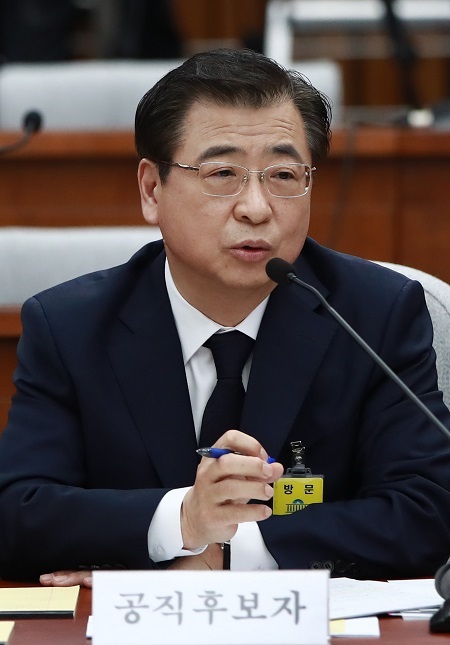Suh Hoon, the National Intelligence Service chief nominee, is promising a spy agency dramatically different from past administrations. Speaking at the first day of his two-day parliamentary hearing Monday, Suh gave an outline of the NIS he envisions, which would require some major changes.
While the main role of the agency concerns national security, the NIS has been implicated in a series of political scandals over the years. Such alleged wrongdoings have damaged the agency’s reputation and fed the view that it worked to protect those in power at any given time.
“In the future, the NIS will be completely cut off from domestic politics. The NIS is not an organization for defending the administration,” Suh said.
 |
National Intelligence Service director-nominee Suh Hoon speaks during a parliamentary confirmation hearing at the National Assembly in Seoul on May 29, 2017. (Yonhap) |
In line with such ideals, Suh hinted that the allegations regarding the agency’s involvement in the 2012 presidential election may be given further scrutiny. In the run-up to the 2012 presidential election, it was alleged that NIS agents were tasked with creating an online environment favorable to the then candidate from the ruling party, former President Park Geun-hye. It was further alleged that the police investigation into the case was silenced by those in power. Won Se-hoon, the NIS director at the time, is currently on trial over related issues.
Built on long experience with the agency, Suh’s ideals for the NIS are clearly different from those of his predecessors, but may not necessarily completely overlap with those of the administration.
Suh is an NIS man through and through. He joined the agency in 1980 and served for 28 years. During his time at the agency, he served in key posts including chief of North Korean strategies and deputy director. He is also said to have played an essential role in the processes that led to the inter-Korean summits in 2000 and 2007.
One such issue appears to be the Act on Anti-Terrorism for the Protection of Citizens and Public Security. The ruling Democratic Party of Korea strongly opposed the bill in 2016, saying that elements of the act that have the potential to be abused must be modified.
“(The act) exists as a positive law. From the point of view of the NIS, it is right for the law to be implemented,” Suh said.
“(Moon’s opposition to the act in 2016) was based on worries that the act could be abused to violate the rights of civilians. Provided that the NIS and politics are completely severed and proven to be so, such worries will be addressed.”
Regarding the Moon Jae-in administration’s plans to abolish functions of the NIS regarding domestic intelligence gathering, Suh said that such a move may be impractical.
“It is difficult to differentiate between domestic and overseas intelligence,” Suh said.
Suh, however, stated that his position on the issue is not different to that of the administration, adding that the NIS operations Moon is targeting are not related to national security.
“What the administration wants to abolish refers to actions such as gathering intelligence on domestic politics, interfering with elections and surveilling civilians,” he said, adding that the agency’s capabilities in investigating matters of national security should not be weakened.
By Choi He-suk (
cheesuk@heraldcorp.com)




![[Weekender] Korea's traditional sauce culture gains global recognition](http://res.heraldm.com/phpwas/restmb_idxmake.php?idx=644&simg=/content/image/2024/11/21/20241121050153_0.jpg)



